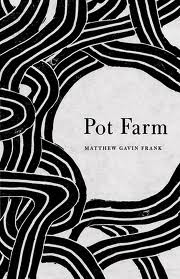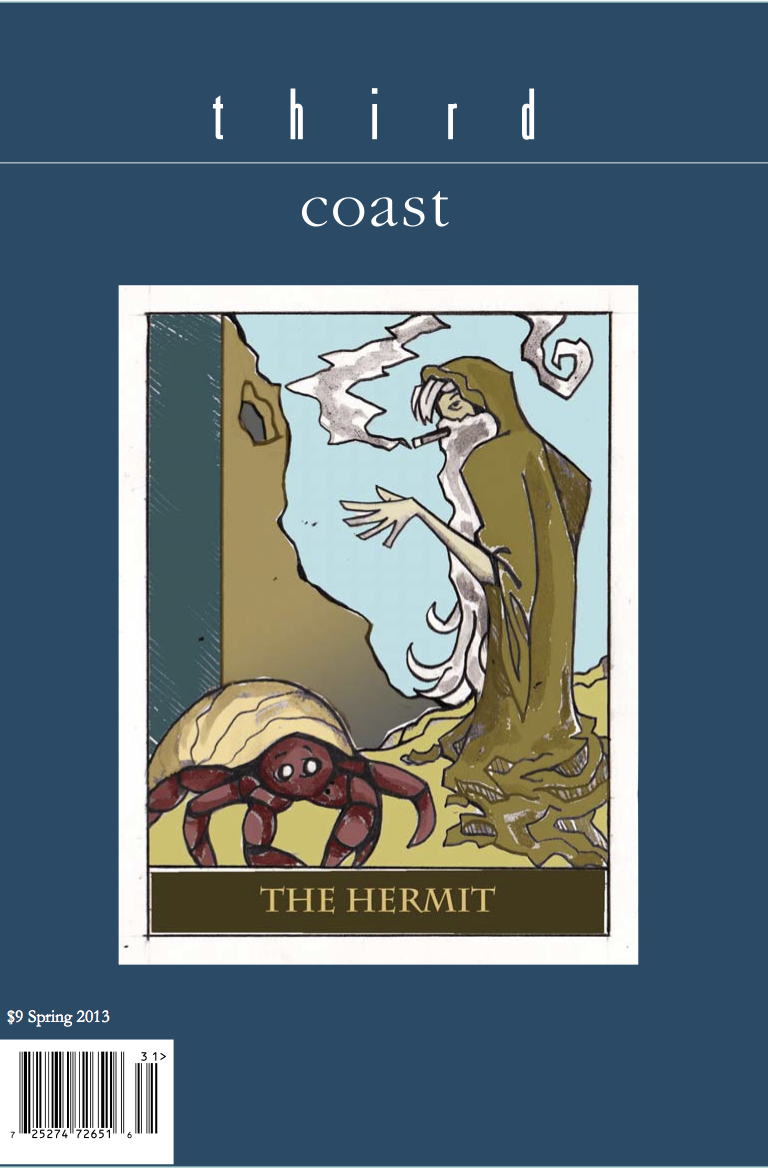Recommended Books
Pot Farm by Matthew Gavin Frank
(University of Nebraska Press: 2012. 232 pages.)
Reviewed by Brandon Davis Jennings

Matthew Gavin Frank’s Pot Farm is a hungry book; it craves understanding, compassion, friendship, forgiveness, and actual food and drink. (My signed copy tried to drink my chamomile tea in order to show Frank that it’s okay to drink chamomile tea, and that his avoidance of chamomile tea and diet coke are only hurting his quest for completely freed artistic expression.) But the metaphorical hunger in the book can be seen through Frank-as-character’s attempts to fit into the world of medicinal marijuana growers/cutters/pickers/smokers and in the way that Frank-as-narrator struggles to situate himself and his unreliability in the world of contemporary CNF narrators. And he fits in—believe me. In fact, to admit early on that many of the events related in the book were likely blurred by his altered state of mind or his imperfect memory is something that a writer of non-fiction shouldn’t have to say; it should be implied. But as he says he’s “Waiting to be crucified on Oprah and then sign a seven-figure deal” (2). Which is ironic, obviously, since by noting that his non-fiction book might not be an exact account of the events within, he has stripped himself of the chance to be crucified and then make millions off of his own non-deadly crucifixion.
It’s not just the hunger or the admission of fallibility that I find engaging in Frank’s book, though. Odd characters abound and weave through the narrative, coloring the story with giant breasts, and strange cysts behind their ears. Characters complain about food while imparting knowledge about marijuana farms and knowledge about lived experiences without it ever seeming staged. Frank-as-narrator often makes light of, but still addresses, his own questions about masculinity within this world he’s become a part of. A few memory trips back to high school locker rooms and some dick jokes (used to illustrate Frank’s discomfort with his peer’s wittiness while at once showing his desire to make a dick joke to “fit in”—one of life’s most complicated dilemmas for contemporary man…I’m not joking) of his in the narrative-present help to shape the narrator into a man who is much more interested in the whys of the world he is living in, far beyond just those of the pot farm. Frank dips in and out of memory and the present-narrative deftly and for good reason. He uses past events to evaluate the present and uses present events to reevaluate the past, and lucky for the reader, he’s damn funny and earnest while doing it.
What I haven’t mentioned yet, because it is more of a structural compliment, is that this book could be classified as a cancer narrative. Frank’s mother had cancer and had chemo-therapy, and that motivated Frank and his wife to return home to help his mother and father with the complications of everyday living, and also, to be at home with his sick mother and grieving father and so on. Frank mentions in the opening chapter “I’m a little neurotic about engaging the whole ‘mom-with-cancer’ thing. Books about such events seem ubiquitous these days, and I hope you don’t think this is one of those stories” (3). Although I don’t know what the word “ubiquitous” means (another kind of food he won’t eat because of the memories it conjures, I suppose), Frank can rest assured that Pot Farm is not one of those stories, and it is not one of those stories in such a way that it might actually be a bridge for people who’ve never viewed marijuana as anything but a problem to cross and look at things in a different way; though Pot Farm never, ever sinks to the level of didaction that Upton Sinclair did at the close of The Jungle. (There are more differences between Pot Farm and The Jungle than that, but what does that have to do with anything?)
By choosing to avoid a narrative that focuses on his mother’s cancer treatment and the overwhelming sadness that would likely come off to readers as too sentimental or melodramatic (not as a result of Frank’s writing ability, but because it’s been done so many times now that people would have a hard time seeing even the potential for anything new or interesting to be said about the whole ‘mom with cancer’ thing—a result of an overabundance of cancer narratives, good and bad, coupled with what might be a called a cultural jadedness). Frank brilliantly subverts a reader’s expectations by taking us to the pot farm where he and his wife smoke marijuana to try and reevaluate their lives after the events they’d experienced and also work on the pot farm as a way of trying to understand past trauma and sadness. I hesitate to use the word “healing” because I don’t think Frank would like me to say anything that campy about the book, and also because such an idea is a bit corny no matter what lens you view it through. But I will say that people are on this pot farm because they like to smoke weed, and because they want to help people, and because they, like most humans, have an inherent drive to do something while they're still breathing, and on and on.
This is far from a simple book, but it will likely leave some readers dissatisfied. I imagine those who walk away after reading Pot Farm without feeling satisfied are people who expect that art is meant to fill them up in some way. And Pot Farm does fill one up, but with questions while, at once, relaying information about an industry that is fraught with peril. Snipers sit atop trees scanning for poachers and vigilante pot-farm-destroyers. The threat of a police raid is ever-present. Helicopters can fly by to investigate and make aerial assessments of the pot farm’s production capacity at any time. And these are just the potential threats in the physical world. Clearly Pot Farm is a world of uncertainty filled with people who want to help others and with people who want to help themselves; it is our world distilled. And Frank creates this world in a way that can stimulate a reader intellectually while at once offering readers who want to experience the emotional richness that surrounds and inhabits the people of the world he shows us a chance to do that too. This isn’t a cancer book. But it is a book that could eat you up.
***
Matthew Gavin Frank is the author of Pot Farm (The University of Nebraska Press/Bison Books), Barolo (The University of Nebraska Press), Warranty in Zulu (Barrow Street Press), The Morrow Plots (forthcoming from Black Lawrence Press/Dzanc Books), Sagittarius Agitprop (Black Lawrence Press/Dzanc Books), and the chapbooks Four Hours to Mpumalanga (Pudding House Publications), and Aardvark (West Town Press). Recent work appears in The New Republic, The Huffington Post, Field, Epoch, AGNI, The Iowa Review, Seneca Review, Crazyhorse, Indiana Review, North American Review, Pleiades, Crab Orchard Review, The Best Food Writing, The Best Travel Writing, Creative Nonfiction, Prairie Schooner, Hotel Amerika, Gastronomica, and others. He was born and raised in Illinois, and currently teaches Creative Writing in the MFA Program at Northern Michigan University, where he is the Nonfiction Editor of Passages North. This winter, he prepared his first batch of whitefish-thimbleberry ice cream.
Brandon Davis Jennings is an Iraq War veteran from West Virginia. His work has appeared or is forthcoming in Hayden's Ferry Review, Crazyhorse, Black Warrior Review, Ninth Letter, Passages North, TriQuarterly and elsewhere. His chapbook Waiting for the Enemy was the 2012 Single Author Chapbook Competition winner at Iron Horse Literary Review. He lives in South Bend, Indiana, with his wife Tina and their frisbee-catching dog Finn.
